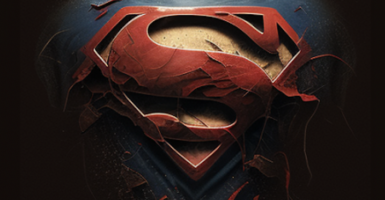Movie Review: RoboCop Could Be Worse, But That Doesn’t Make It Good
Should you buy that for a dollar?
This article is more than 2 years old
 Here’s the thing about the new RoboCop remake: more than a rehash of Paul Verhoeven’s 1987 original, this film is a retelling of RoboCop via a device used in another Verhoeven joint, Starship Troopers. Samuel L. Jackson pops up throughout as ultra-conservative talk show host Pat Novak. His broadcasts punctuate the narrative like the “Would You Like To Know More” segments in Troopers, and they function the same way. Director Jose Padilha (Elite Squad) tries for the same effect, but, like with the rest of the film, misses the mark.
Here’s the thing about the new RoboCop remake: more than a rehash of Paul Verhoeven’s 1987 original, this film is a retelling of RoboCop via a device used in another Verhoeven joint, Starship Troopers. Samuel L. Jackson pops up throughout as ultra-conservative talk show host Pat Novak. His broadcasts punctuate the narrative like the “Would You Like To Know More” segments in Troopers, and they function the same way. Director Jose Padilha (Elite Squad) tries for the same effect, but, like with the rest of the film, misses the mark.
Novak argues in favor squads of armed drones patrolling the streets in what amounts to a militarized fascism, much like the government in Troopers mimics that of Nazi Germany. The thing is, RoboCop doesn’t go far enough in that direction; super timid, it never pushes into the extremes that it needs to in order to get this point across. You know that there are people in the theaters nodding along, going, “the man has a point,” totally missing what the film is trying to get at.
Here’s the other thing about RoboCop: it’s not that bad. We’re not talking about an egregious affront to cinema. Don’t get me wrong, it’s totally shitty, but all of the cries of, “it could be worse,” floating around are pretty accurate. More than anything, this stands in the same league as schlocky, pulpy, DTV B-action, but still not even towards the top of that realm. Also, let it be said that the fact that a film could have sucked more, shouldn’t be a rousing endorsement, or a sentiment that get you jazzed to go to the theater. It’s easy to see why the studio dumped this in the desolate wasteland that is February. For this time of year, it’s passable, especially in comparison to the trite romance flooding the Valentine’s Day box office.
You know the story. It’s the near future, and Alex Murphy (Joel Kinnaman) may be the last honest cop in the crime-ridden cesspool known as Detroit. When he runs afoul of a notorious criminal, he gets car bombed all to hell. Evil-ish multinational conglomerate OmniCorp, who wants their military drones to patrol the streets but are blocked by that pesky will-of-the-people thing, puts him back together as a part man, part robot crime-fighting machine. And voila, you have the plot to RoboCop. Sounds familiar, right?
 The remake does get points for taking the source material and at least trying to add new elements into the mix. This time around, Murphy’s character is much more in play. Whereas Verhoeven’s version only remembers his past life in fits and hazy bursts, RoboCop 2014 has full recall and knows who he is, as does his family. Problem is the new stuff doesn’t work very well. You don’t get much familial connection aside from a quick scene where Murphy talks about hockey with his son and makes out with his wife, Clara (Abbie Cornish). You’re left to assume this love and devotion without actually seeing it for yourself. It’s there, but it’s totally empty an undeveloped, and you never connect with any of the characters.
The remake does get points for taking the source material and at least trying to add new elements into the mix. This time around, Murphy’s character is much more in play. Whereas Verhoeven’s version only remembers his past life in fits and hazy bursts, RoboCop 2014 has full recall and knows who he is, as does his family. Problem is the new stuff doesn’t work very well. You don’t get much familial connection aside from a quick scene where Murphy talks about hockey with his son and makes out with his wife, Clara (Abbie Cornish). You’re left to assume this love and devotion without actually seeing it for yourself. It’s there, but it’s totally empty an undeveloped, and you never connect with any of the characters.
Exponentially more time is spent showing Dr. Dennett Norton (Gary Oldman) tinkering with RoboCop, than actually developing characters or relationships. This section is by far the most interesting, unique part of the film, playing like a superhero origin story. The interactions between Norton and Murphy are the most earnest in the entire movie. But when Padilha does finally move on, the further the film progresses, the more it sinks. After a while, Murphy is zipping around Motown on his badass motorbike—which, with all the flashing lights, resembles a mobile rave—grabbing criminals, rousting drug labs, and generally causing chaos in the underworld.
In a movie of this sort, you hope this part of the story is the highlight. You can forgive damn near any cinematic sin if the action is right, and RoboCop could have salvaged itself here and been a fun, if mindless, ride. But it doesn’t, and it isn’t. Jittery and full of obnoxious gimmicks, the action borders on incomprehensible visual gibberish. Even though they try to edit around them, there are multiple instances where the film has obviously been sped up, and Padilha goes out of his way to use make you feel like you’re in the middle of a videogame. You cringe every time the film places you in RoboCop’s point of view, with all of his various graphics superimposed on the screen, distracting you and interrupting the scene. For a movie that cost $100 million, it feels cheap, like you’re watching a hack videogame movie like Doom. Out of all of the other issues with the film, crappy action is the most disappointing, and the least forgivable.
The lack of a central villain keeps RoboCop from having much focus or a mission; the bad-guy-by-committee thing they have going on doesn’t work. The main criminal is toothless and generic, a neutered version of Clarence Boddicker. OmniCorp isn’t so much evil and out for world domination as they are a bunch of dicks that want to make a lot of money. By extension, CEO Raymond Sellers (Michael Keaton, who is actually the best part of the movie) is in the same boat. He’s not the worst person in the world, he only wants a huge profit by any means necessary, and that middle of the road stance makes his turn at the end awkward and unearned. Jay Baruchel’s smarmy marketing exec has a few modestly humorous lines, but nothing particularly sharp or noteworthy, since the film doesn’t offer any room to breathe. The first time you meet Maddox (Jackie Earle Haley), apparently the one person anywhere who handles OmniCorp drones, you think, okay, this guy is rad, openly talking trash to RoboCop as he does. But then he keeps showing up, doing the exact same thing, and wears out his welcome.
RoboCop wants to be about big ideas like identity, the nature of self, man versus technology in a modern world, security versus freedom, corporate greed that puts profits over people, and all manner of lofty themes. The problem is that the film never takes any time to actually explore any of these, and they’re dealt with in the most superficial, slipshod way. Even without comparing this to the original, RoboCop just isn’t a very good movie. Instantly forgettable, it’s still somehow better than Total Recall, and when that’s the best thing you can say about a movie, something is very wrong.












